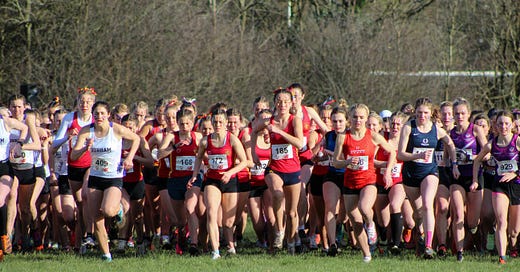Road and XC Scoring on OpenTrack
Understanding your options for scoring cross country and road races on OpenTrack
After last week’s look at chip timing integration for adding road and cross country results to OpenTrack, this week is perfect for an introduction on what OpenTrack can do with your results once uploaded.
In this update:
An introduction to configurable scoring on OpenTrack
How should performances be scored?
Selecting who to score
Without OpenTrack, scoring can be infinitely complex and involve spreadsheet formulas longer than your standard cross country course, but thanks to a fully configurable scoring interface, you can use OpenTrack to instantaneously score any road or cross country race.
An introduction to configurable scoring on OpenTrack
Though OpenTrack’s configurable scoring has numerous options to fit your needs, the premise is simple — you can create as many scoring tables as you want for an event, each using one of the available calculation methods, with each athlete’s performance counting once or not at all.
How should performances be scored?
Deciding how to score your event can be difficult, and OpenTrack provides numerous options for scoring performances.
To keep things simple, here’s an explanation of the four most useful methods for scoring road and cross country events, using a hypothetical set of results.
Sum of filtered race positions
OpenTrack’s configurable scoring allows you to score only certain athletes (more on that below).
With sum of filtered race positions selected, athletes are scored on the positions they would have had if the athletes filtered out weren’t competing at all.
By way of example, a match just between England vs Wales using sum of filtered race positions would score athletes using the performances using the positions in the table below.
In this scenario, Wales’ 9 points beats England’s 12 points.
Sum of absolute race positions
With sum of absolute race positions selected, even if you have filtered your results, athletes are scored based on their position in the overall race.
Using the England vs Wales example, we get a different outcome this time, with England (24 points) beating Wales (27 points).
Sum of times
If an athlete finishes minutes ahead of the field, maybe you want to reward that, instead of scoring them only slightly better than second place.
Using sum of times, teams are ranked according to the total of their athletes’ performances.
If we use England vs Northern Ireland as an example, using sum of filtered race positions or sum of absolute race positions would see Northern Ireland take the win.
Using sum of times however, England (total time 89:34) would beat Northern Ireland (total time 91:03) due to their lead athlete being significantly faster than anyone else.
Sum of age grades
Useful for events with masters athletes competing over the same distance, sum of age grades allows you to easily score across age categories, with performances scored on their age graded value.

As can be seen below in an example from a masters’ Inter-Area match in the UK, athletes are not ranked by who crossed the line first, but instead on who did the best for their age, with the best scorer having finished two minutes behind the leader.
Selecting who to score
One of the key benefits of OpenTrack’s configurable scoring is the ability to filter who scores in each scoring table, and most filtering of results can be done using three straightforward options.
Categories
Combined races take place all the time, and often you will have athletes in different age categories competing together, who you want to score separately.
In a league match where U13 and U15 boys and girls compete alongside one another, you could do the following for a scoring table solely for U13 girls:
Genders
Alternatively, if your race contains only boys and girls in a single age group, you could use the gender filter to create a scoring table for one of them.
The other available options cover mixed teams, allowing you to choose whether to have a specific, or flexible number of women in a scoring team.

Teams
For scoring between a restricted set of teams in an event, the filter teams option is ideal.
As an example, England vs Wales scoring table in a larger Home Countries International, as in the examples above, could be achieved as follows:
There’s plenty more to OpenTrack’s configurable scoring than can be contained in this email — for more information you can check out our documentation, and feel free to let us know if you have any questions.
As always, if you have any feedback, requests, or want help bringing your athletics into the 21st century, feel free to get in touch at info@opentrack.run.












